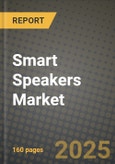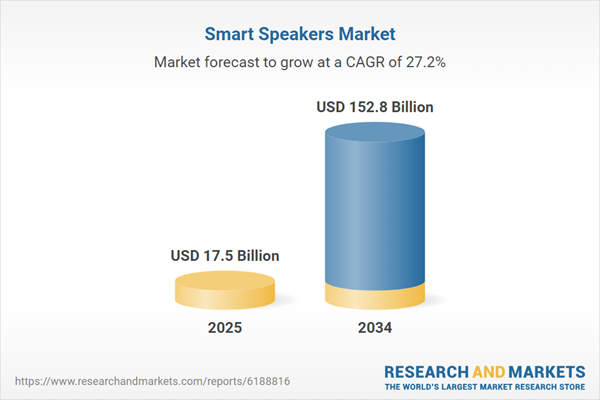The smart speakers market has emerged as a cornerstone of the connected home ecosystem, blending voice-assisted technology with AI-driven functionality to offer hands-free access to information, entertainment, and smart device control. These speakers integrate virtual assistants such as Amazon Alexa, Google Assistant, and Apple Siri, enabling users to interact with their digital environments using natural language. Beyond music playback and weather updates, smart speakers are now central hubs for managing lights, thermostats, security systems, and more. Their rapid adoption is driven by consumer demand for convenience, personalized experiences, and the ability to multitask more effectively. Tech-savvy consumers and busy households alike appreciate the efficiency smart speakers bring to daily routines. With affordability improving and voice recognition technology becoming more sophisticated, these devices are seeing deeper penetration across various demographic groups and geographical regions, including emerging markets with rising digital infrastructure.
The smart speakers market saw a shift toward multifunctionality and ecosystem expansion. Leading manufacturers introduced models with upgraded audio quality, touchscreen interfaces, and seamless interoperability with broader smart home platforms. Smart speakers increasingly came bundled with household appliance packages or offered as value-added services by telecom and utility providers. Voice assistants became more contextual, capable of managing complex queries and multi-step tasks. Language support expanded significantly in Asia, Latin America, and Africa, unlocking new growth opportunities. Privacy-enhancing features were introduced more widely, including local data processing and improved control over voice recordings. Brands invested in edge computing integration to reduce latency in voice commands, enhancing user experience. The gaming and entertainment sectors also started embedding smart speakers in VR headsets and home consoles, creating new channels for content delivery. Additionally, voice commerce continued to rise, with more consumers using smart speakers to place orders, manage subscriptions, or track deliveries, reflecting a convergence of commerce and voice interaction.
The smart speakers market is poised for another leap forward as AI models become more personalized and multimodal interaction becomes standard. Devices will begin interpreting tone, emotion, and context with greater accuracy, enabling more intuitive conversations. Smart speakers may evolve into full-service digital companions, capable of managing health reminders, financial updates, or educational guidance tailored to each household member. Integration with generative AI tools will allow users to compose emails, generate recipes, or create media content via voice alone. We also expect tighter integration with other smart devices - from mirrors and TVs to appliances - forming a seamless voice-first interface across all touchpoints of a connected lifestyle. On the enterprise front, smart speakers will increasingly find their way into offices, hotels, and healthcare facilities, helping manage workflows, meetings, or patient care. However, despite technological gains, market growth will hinge on consumer trust in data security and ethical AI use, making transparency and regulation vital in the evolving landscape.
Key Insights: Smart Speakers Market
- Adoption of Multimodal Interfaces: Smart speakers are incorporating visual displays, gesture controls, and haptic feedback alongside voice input, creating richer, more interactive experiences for users across both home and commercial environments.
- Growth in Voice Commerce Usage: Consumers are increasingly using smart speakers for shopping tasks, including ordering groceries, reordering essentials, and managing subscriptions, driving a new wave of retail and e-commerce innovation.
- Integration with Wellness and Healthcare Services: Smart speakers now assist with medication reminders, guided meditation, fitness routines, and symptom checks, positioning them as tools for holistic wellness support at home.
- Localized Voice Assistant Deployment: As manufacturers expand into new markets, smart speakers are offering native language support, localized content, and region-specific integrations to enhance user adoption and cultural relevance.
- Enhanced Privacy Controls and Edge Computing: To address data security concerns, newer models process voice data locally and provide users with clearer controls over stored information and microphone activity.
- Rising Adoption of Smart Home Ecosystems: Smart speakers are the gateway to broader smart home functionality, encouraging adoption as consumers integrate lighting, thermostats, security, and entertainment into unified voice-controlled environments.
- Increasing Demand for Hands-Free Convenience: Busy lifestyles are fueling the need for voice-activated tools that allow users to perform multiple tasks simultaneously, from setting timers to managing appointments or playing music.
- Advancements in Natural Language Processing: Improved understanding of context, accents, and multilingual queries has enhanced user satisfaction and opened the market to more global demographics and use cases.
- Rising Penetration of Affordable Devices: Entry-level smart speakers are now widely available at budget-friendly prices, making them accessible to a broader audience and driving household adoption in price-sensitive regions.
- Consumer Concerns Around Privacy and Surveillance: Despite improved controls, ongoing skepticism about constant listening, data collection, and third-party access continues to hinder adoption among privacy-conscious users, necessitating transparent data policies and robust encryption standards.
Smart Speakers Market Segmentation
By Intelligent Virtual Assistant
- Amazon Alexa
- Google Assistant
- Siri
- Cortana
- Other Intelligent Virtual Assistants
By Distribution Channel
- Online
- Offline
By Application
- Smart Home
- Smart Office
- Consumer
- Other Applications
By End User
- Personal
- Commercial
Key Companies Analysed
- Amazon.com Inc.
- Apple Inc.
- Xiaomi Corporation
- Alibaba Group Holding Limited
- Sonos Inc.
- Harman International Industries Incorporated
- Bose Corporation
- Sony Corporation
- ONKYO CORPORATION
- Panasonic Corporation
- Alphabet Inc.
- Baidu Inc.
- Plantronics Inc.
- Pioneer Corporation
- SK Telecom Co. Ltd.
- Lenovo Group Limited
- Samsung Electronics Co. Ltd.
- Avnera Corporation
- Fabriq
- Invoxia
- LG Electronics Inc.
- Libratone A/S
- Mobvoi Inc.
- Mojo
- Ultimate Ears
- Yamaha Corporation
- Edifier International Limited
- Meta Platforms Inc.
- Jam Audio
- Kakao Corporation
- KitSound by Kondor Ltd.
- Koninklijke Philips N.V.
- Logitech International S.A.
- Beijing LingLong Electronics Co. Ltd.
- Deutsche Telekom AG
- Anker Innovations
- JBL
- Marshall Amplification plc
Smart Speakers Market Analytics
The report employs rigorous tools, including Porter’s Five Forces, value chain mapping, and scenario-based modeling, to assess supply-demand dynamics. Cross-sector influences from parent, derived, and substitute markets are evaluated to identify risks and opportunities. Trade and pricing analytics provide an up-to-date view of international flows, including leading exporters, importers, and regional price trends.Macroeconomic indicators, policy frameworks such as carbon pricing and energy security strategies, and evolving consumer behavior are considered in forecasting scenarios. Recent deal flows, partnerships, and technology innovations are incorporated to assess their impact on future market performance.
Smart Speakers Market Competitive Intelligence
The competitive landscape is mapped through proprietary frameworks, profiling leading companies with details on business models, product portfolios, financial performance, and strategic initiatives. Key developments such as mergers & acquisitions, technology collaborations, investment inflows, and regional expansions are analyzed for their competitive impact. The report also identifies emerging players and innovative startups contributing to market disruption.Regional insights highlight the most promising investment destinations, regulatory landscapes, and evolving partnerships across energy and industrial corridors.
Countries Covered
- North America - Smart Speakers market data and outlook to 2034
- United States
- Canada
- Mexico
- Europe - Smart Speakers market data and outlook to 2034
- Germany
- United Kingdom
- France
- Italy
- Spain
- BeNeLux
- Russia
- Sweden
- Asia-Pacific - Smart Speakers market data and outlook to 2034
- China
- Japan
- India
- South Korea
- Australia
- Indonesia
- Malaysia
- Vietnam
- Middle East and Africa - Smart Speakers market data and outlook to 2034
- Saudi Arabia
- South Africa
- Iran
- UAE
- Egypt
- South and Central America - Smart Speakers market data and outlook to 2034
- Brazil
- Argentina
- Chile
- Peru
Research Methodology
This study combines primary inputs from industry experts across the Smart Speakers value chain with secondary data from associations, government publications, trade databases, and company disclosures. Proprietary modeling techniques, including data triangulation, statistical correlation, and scenario planning, are applied to deliver reliable market sizing and forecasting.Key Questions Addressed
- What is the current and forecast market size of the Smart Speakers industry at global, regional, and country levels?
- Which types, applications, and technologies present the highest growth potential?
- How are supply chains adapting to geopolitical and economic shocks?
- What role do policy frameworks, trade flows, and sustainability targets play in shaping demand?
- Who are the leading players, and how are their strategies evolving in the face of global uncertainty?
- Which regional “hotspots” and customer segments will outpace the market, and what go-to-market and partnership models best support entry and expansion?
- Where are the most investable opportunities - across technology roadmaps, sustainability-linked innovation, and M&A - and what is the best segment to invest over the next 3-5 years?
Your Key Takeaways from the Smart Speakers Market Report
- Global Smart Speakers market size and growth projections (CAGR), 2024-2034
- Impact of Russia-Ukraine, Israel-Palestine, and Hamas conflicts on Smart Speakers trade, costs, and supply chains
- Smart Speakers market size, share, and outlook across 5 regions and 27 countries, 2023-2034
- Smart Speakers market size, CAGR, and market share of key products, applications, and end-user verticals, 2023-2034
- Short- and long-term Smart Speakers market trends, drivers, restraints, and opportunities
- Porter’s Five Forces analysis, technological developments, and Smart Speakers supply chain analysis
- Smart Speakers trade analysis, Smart Speakers market price analysis, and Smart Speakers supply/demand dynamics
- Profiles of 5 leading companies - overview, key strategies, financials, and products
- Latest Smart Speakers market news and developments
Additional Support
With the purchase of this report, you will receive:- An updated PDF report and an MS Excel data workbook containing all market tables and figures for easy analysis.
- 7-day post-sale analyst support for clarifications and in-scope supplementary data, ensuring the deliverable aligns precisely with your requirements.
- Complimentary report update to incorporate the latest available data and the impact of recent market developments.
This product will be delivered within 1-3 business days.
Table of Contents
Companies Mentioned
- Amazon.com Inc.
- Apple Inc.
- Xiaomi Corporation
- Alibaba Group Holding Limited
- Sonos Inc.
- Harman International Industries Incorporated
- Bose Corporation
- Sony Corporation
- ONKYO CORPORATION
- Panasonic Corporation
- Alphabet Inc.
- Baidu Inc.
- Plantronics Inc.
- Pioneer Corporation
- SK Telecom Co. Ltd.
- Lenovo Group Limited
- Samsung Electronics Co. Ltd.
- Avnera Corporation
- Fabriq
- Invoxia
- LG Electronics Inc.
- Libratone A/S
- Mobvoi Inc.
- Mojo
- Ultimate Ears
- Yamaha Corporation
- Edifier International Limited
- Meta Platforms Inc.
- Jam Audio
- Kakao Corporation
- KitSound by Kondor Ltd.
- Koninklijke Philips N.V.
- Logitech International S.A.
- Beijing LingLong Electronics Co. Ltd.
- Deutsche Telekom AG
- Anker Innovations
- JBL
- Marshall Amplification PLC
Table Information
| Report Attribute | Details |
|---|---|
| No. of Pages | 160 |
| Published | October 2025 |
| Forecast Period | 2025 - 2034 |
| Estimated Market Value ( USD | $ 17.5 Billion |
| Forecasted Market Value ( USD | $ 152.8 Billion |
| Compound Annual Growth Rate | 27.2% |
| Regions Covered | Global |
| No. of Companies Mentioned | 38 |









